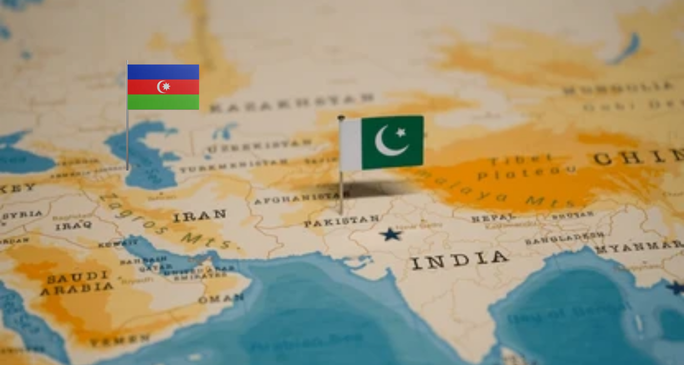|
|
TODAY.AZ / Analytics
Azerbaijan, Pakistan's strategic partnership shapes Central Asia
12 February 2025 [21:54] - TODAY.AZ

By Raza Syed | AzerNEWS
The evolving geopolitical landscape of Central Asia has been witnessing increasing collaboration between Pakistan and Azerbaijan, two strategically positioned nations with shared historical, economic, and diplomatic interests. As regional dynamics shift due to global power reconfigurations, economic partnerships, and energy security concerns, the growing alliance between Islamabad and Baku carries the potential to shape the future of Central Asia. This analysis explores the motivations behind this partnership, its implications, and how it positions both nations within the broader regional and global context.
Pakistan and Azerbaijan share deep-rooted historical and cultural connections, reinforced by their common Islamic heritage and linguistic similarities between the Turkic and Indo-Iranian language groups. Pakistan was among the first countries to recognize Azerbaijan’s independence in 1991, laying the foundation for strong bilateral relations. This support has been reciprocated on international platforms, with Pakistan backing Azerbaijan’s stance on the Nagorno-Karabakh conflict, and Azerbaijan advocating for Pakistan’s position on Kashmir. Such diplomatic solidarity has paved the way for increased cooperation in economic, defense, and strategic affairs.
The economic partnership between Pakistan and Azerbaijan is expanding, particularly in trade, energy, and connectivity. Azerbaijan’s rich oil and gas reserves present significant opportunities for Pakistan, which faces chronic energy shortages. Agreements between Pakistan and the State Oil Company of Azerbaijan Republic (SOCAR) have facilitated discussions on liquefied natural gas (LNG) supply, while Pakistan’s textile and agricultural sectors offer viable export markets for Azerbaijan. Both countries are also exploring avenues for regional trade connectivity through corridors such as the Middle Corridor, which links China to Europe via Central Asia and the Caucasus, and the China-Pakistan Economic Corridor (CPEC), which offers Azerbaijan access to the Arabian Sea.
Defense collaboration has been another focal point of Pakistan-Azerbaijan relations. Military cooperation has included training programs, joint exercises, and defense procurements, with Azerbaijan showing interest in acquiring advanced defense technology from Pakistan, including JF-17 fighter jets and other military hardware. This partnership strengthens Azerbaijan’s defense capabilities while positioning Pakistan as a key defense supplier in the region. Furthermore, both nations have engaged in intelligence sharing and counter-terrorism efforts, contributing to regional stability.
The strategic implications of this alliance extend beyond bilateral interests, influencing broader regional dynamics in Central Asia. Strengthened ties between Pakistan and Azerbaijan provide alternative economic and trade routes for landlocked Central Asian states, reducing their dependency on traditional transit routes dominated by major powers such as Russia and China. Azerbaijan’s active role in the Trans-Caspian International Transport Route (TITR) aligns with Pakistan’s vision of becoming a connectivity hub, enabling greater access to Central Asian markets.
Geopolitically, this partnership diversifies alliances and balances regional power structures. Pakistan’s engagement with Azerbaijan enhances its influence within multilateral organizations such as the Economic Cooperation Organization (ECO) and the Organization of Islamic Cooperation (OIC). Simultaneously, Azerbaijan benefits from a stronger strategic presence in South Asia, bolstering its role as a key regional player linking Europe, the Middle East, and Asia.
Beyond economic and defense ties, cultural and educational exchanges between the two nations have further strengthened bilateral relations. Celebrations of cultural events, academic collaborations, and scholarship programs have facilitated people-to-people connections, enhancing mutual understanding. Additionally, Azerbaijan and Pakistan have invested in technological cooperation, exploring potential collaborations in IT, telecommunications, and sustainable energy solutions.
Despite the promising trajectory of Pakistan-Azerbaijan relations, challenges remain. Geopolitical tensions, particularly in Afghanistan and the broader South Asian region, pose potential risks to regional stability. Infrastructure and logistical constraints must also be addressed to fully harness the potential of connectivity initiatives. Moreover, fluctuating economic conditions in both countries may impact long-term trade and investment commitments.
Looking ahead, sustained diplomatic engagement, expanded trade agreements, and enhanced multilateral collaborations will be crucial in solidifying this partnership. Both nations must navigate evolving regional power dynamics strategically to ensure long-term mutual benefits. The growing alliance between Pakistan and Azerbaijan represents a significant shift in Central Asia’s geopolitical and economic landscape, fostering greater regional integration and offering alternative pathways for development. As these two nations continue to strengthen their ties, their influence in Central Asia is set to expand, promoting economic resilience, security cooperation, and a balanced regional power structure.
URL: http://www.today.az/news/analytics/256965.html
 Print version
Print version
Connect with us. Get latest news and updates.
See Also
- 27 January 2026 [14:03]
Strategic alliance with economic impact: What Azerbaijan-Israel Forum really means - 27 January 2026 [08:30]
How Azerbaijan is cutting China–Europe transit times through Middle Corridor - 26 January 2026 [13:45]
Gold at $5,000: The world’s fear thermometer is flashing red - 24 January 2026 [20:50]
Moldova’s unification debate, stripped of romance - 24 January 2026 [15:10]
Dugin and Solovyov’s rhetoric reveals Kremlin’s new priorities in post-soviet space - 23 January 2026 [13:55]
Ukraine, Russia and United States: What can realistically emerge from tripartite meeting? - 22 January 2026 [08:30]
How Azerbaijan turns energy wealth into long-term growth - 21 January 2026 [13:45]
Cooperation expands in Caucasus as conflict gives way to dialogue - 21 January 2026 [08:30]
Azerbaijan, BlackRock and the new geopolitics of infrastructure - 19 January 2026 [13:55]
Europe’s energy security boosted by Azerbaijani gas, not Russian supplies
Most Popular
 United States has confirmed Baku's leading role in South Caucasus: Davos aftershocks
United States has confirmed Baku's leading role in South Caucasus: Davos aftershocks
 Azerbaijan's Second Oil Boom: forecasts and opportunities
Azerbaijan's Second Oil Boom: forecasts and opportunities
 30,000 deaths claimed in Iran protests as officials report mass casualties
30,000 deaths claimed in Iran protests as officials report mass casualties
 Washington Post flags risk of ethnic spillover as US weighs Iran intervention
Washington Post flags risk of ethnic spillover as US weighs Iran intervention
 Azerbaijan’s exports to Armenia grow as ties warm after historic rapprochement
Azerbaijan’s exports to Armenia grow as ties warm after historic rapprochement
 India’s Nipah outbreak triggers policy response in Taiwan
India’s Nipah outbreak triggers policy response in Taiwan
 'Yüks?li?' contest introduces fresh initiatives
'Yüks?li?' contest introduces fresh initiatives
